Greetings! I’m here to provide you with expert insight into the question, “Can fruit flies live in drains?” If you’ve been battling these pesky insects in your kitchen or bathroom, you’re in the right place. In this article, I’ll share valuable information on how to eliminate fruit flies from drain pipes and keep your home fruit fly-free. Let’s dive in!
Key Takeaways:
- Fruit flies and drain flies are different species, with distinct preferences and appearances.
- Identifying the type of fly infestation is crucial for effective elimination.
- Proper sanitation, drain cleaning, and DIY traps can help get rid of drain flies.
- Disposing of decaying fruits and vegetables, using DIY traps, and regular cleaning can eliminate fruit flies from drains.
- Maintaining cleanliness, fixing leaks, and seeking professional help for severe infestations are key to preventing fruit fly and drain fly infestations.
Identifying Drain Flies and Fruit Flies
When dealing with fly infestations, it’s crucial to accurately identify the types of flies involved. In this section, I will guide you through the key characteristics of drain flies and fruit flies, helping you distinguish between the two and effectively tackle the issue.
Drain flies, commonly known as moth flies, are small insects with hairy bodies and wings that appear fuzzy. They measure about 3/16ths of an inch, making them easily distinguishable. You can often find drain flies near drains, leaky pipes, or sewers. These damp and dark environments provide ideal breeding grounds for drain flies, allowing them to thrive and multiply.
On the other hand, fruit flies are a slightly different species with specific preferences. These tiny creatures, approximately an eighth of an inch in size, are typically tan or brown in color, and they possess distinctive red or dark eyes. Fruit flies are primarily found in kitchens and pantries, where they are attracted to decaying fruits and vegetables.
To help you visualize the differences between drain flies and fruit flies, refer to the following table:
| Drain Flies | Fruit Flies |
|---|---|
| Hairy bodies and wings | Tan or brown with red or dark eyes |
| Approximately 3/16ths of an inch in size | About an eighth of an inch in size |
| Commonly found near drains, leaky pipes, or sewers | Typically found in kitchens and pantries |
By understanding these differences in appearance and habitat, you’ll be better equipped to identify whether you’re dealing with a drain fly infestation in drains or a fruit fly infestation around decaying produce.
To enhance your understanding further, take a look at the image below:
Now that you can distinguish between drain flies and fruit flies, let’s move on to the next sections, where we’ll explore effective methods for eliminating these pests and preventing future infestations.
Getting Rid of Drain Flies
To effectively eliminate drain flies from your drains, it is crucial to identify the source of the infestation. Once you have located the breeding ground, you can take the necessary steps to control and prevent their presence.
One of the simplest and most effective methods to start with is running hot water down the drain. This helps to loosen any debris or organic matter stuck to the inner walls of the pipe, making it easier to remove.
If the problem persists, you can try using a homemade solution of baking soda and vinegar. Mix equal parts of both ingredients and pour it down the drain, allowing it to sit for about 15 minutes. This natural combination acts as a powerful cleaner and can help sanitize the drain, eliminating any potential food sources for drain flies.
If you prefer a commercial drain cleaner, products like BioDrain can be highly effective. These specialized cleaners are specifically formulated to target and eliminate organic matter and odors that attract drain flies.
Another technique to consider is pouring hot or boiling water down the drain. This helps further clear out any remaining debris and flushes away any attractants that might be lingering in the drain.
By using a combination of these drain cleaning methods, you can significantly reduce the presence of drain flies and create an inhospitable environment for them to thrive.
Expert Tip:
Regularly maintaining clean drains by utilizing these drain cleaning methods is not only effective in controlling drain flies but can also prevent the occurrence of fruit flies, as both types of pests are attracted to similar conditions.
Removing Fruit Flies from Drains
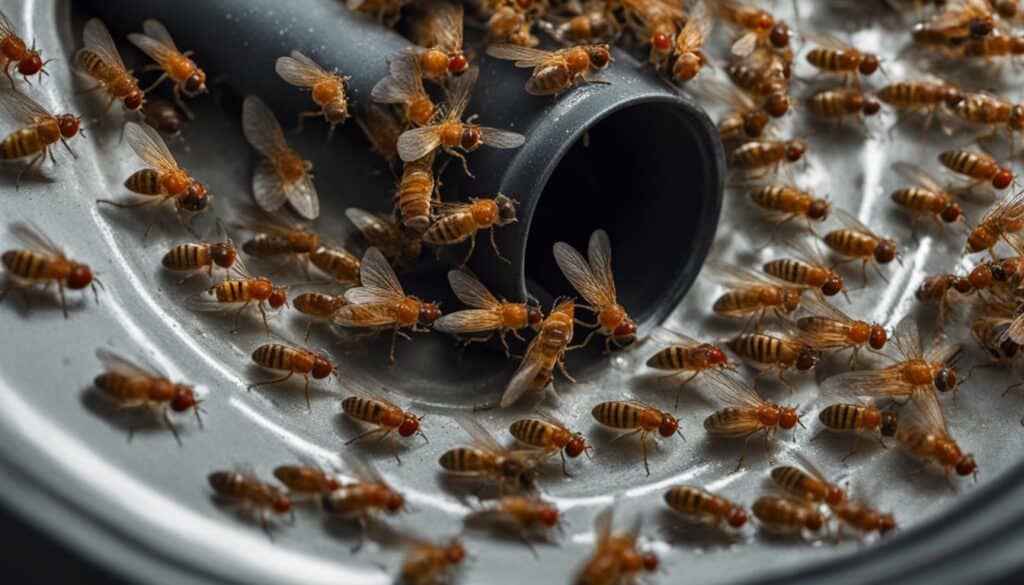
To get rid of fruit flies in drains, I highly recommend taking the following steps:
- Dispose of decaying fruit, vegetables, or other food sources: Fruit flies are attracted to decaying organic matter, so it’s crucial to remove any potential food sources. Throw away rotting fruits or vegetables and clean up any spilled or spoiled food in your kitchen.
- Use a fan to disrupt their flight patterns: Fruit flies are weak fliers and can be easily disturbed by air currents. Place a fan near the affected area to create a strong airflow that disrupts their flight patterns and makes it difficult for them to settle or breed.
- Set up DIY fruit fly traps: One effective fruit fly trap can be created using vinegar and dish soap. Fill a small bowl with vinegar and add a few drops of dish soap. The fruit flies will be attracted to the vinegar scent, but the dish soap will break the surface tension and cause them to drown.
- Regularly clean and sanitize drains, sinks, and garbage disposals: Fruit flies can lay their eggs in organic matter trapped in drains, sinks, and garbage disposals. Regularly clean these areas using a mixture of hot water and a mild household cleaning agent to remove any residues that may serve as breeding grounds for fruit flies.
By following these steps, you can effectively eliminate fruit flies from your drains and prevent future infestations.
Preventing Drain Flies and Fruit Flies
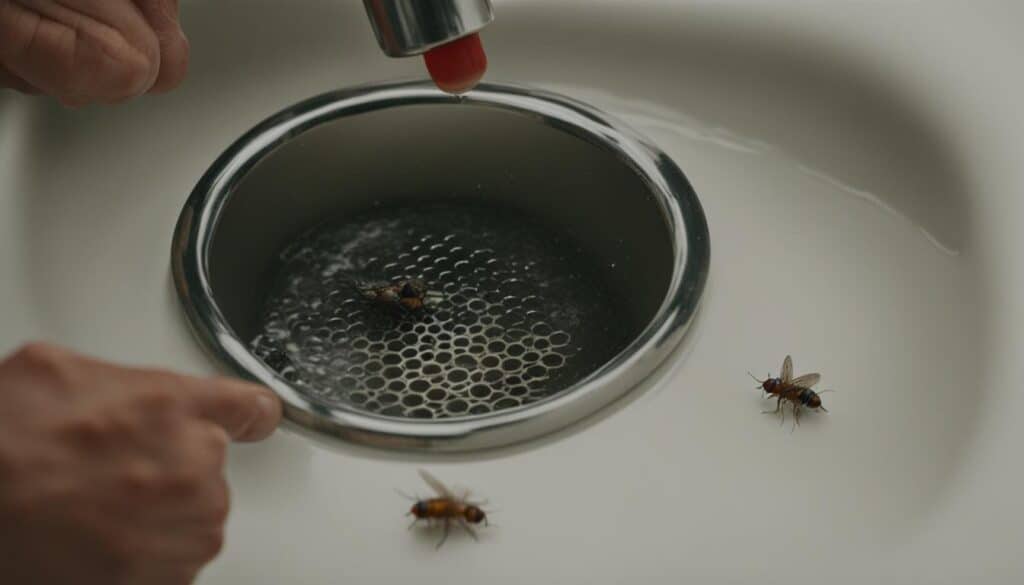
To prevent drain flies and fruit flies from infesting your home, it is crucial to maintain cleanliness and practice proper sanitation. By following these simple steps, you can create an environment that is less attractive to these pesky insects:
- Dispose of decaying fruits and vegetables: Make sure to throw away any overripe or rotting produce to eliminate a potential food source for fruit flies.
- Wipe down counters: Keep your kitchen surfaces clean and free of crumbs to discourage fruit flies from gathering.
- Keep sinks and garbage disposals clean: Regularly clean and sanitize drains, sinks, and garbage disposals to remove any organic matter that may attract drain flies.
- Wash produce immediately: As soon as you bring fresh fruits and vegetables home, rinse them thoroughly to remove any eggs or larvae that may be present.
- Fix leaks and drainage issues: Standing water and damp areas create ideal breeding grounds for drain flies. Promptly repair any leaks or drainage problems in your home to eliminate these potential habitats.
“By maintaining cleanliness and practicing proper sanitation, you can create an environment that is less attractive to drain flies and fruit flies.”
By implementing these preventative measures, you can significantly reduce the chances of drain flies and fruit flies infesting your home. Remember, prevention is key when it comes to keeping these nuisance insects at bay.
Test Table
| Methods | Effectiveness | Difficulty |
|---|---|---|
| Baking soda and vinegar solution | High | Low |
| Commercial drain cleaner | Medium | Medium |
| Hot water flush | Low | Low |
Professional Help for Severe Infestations
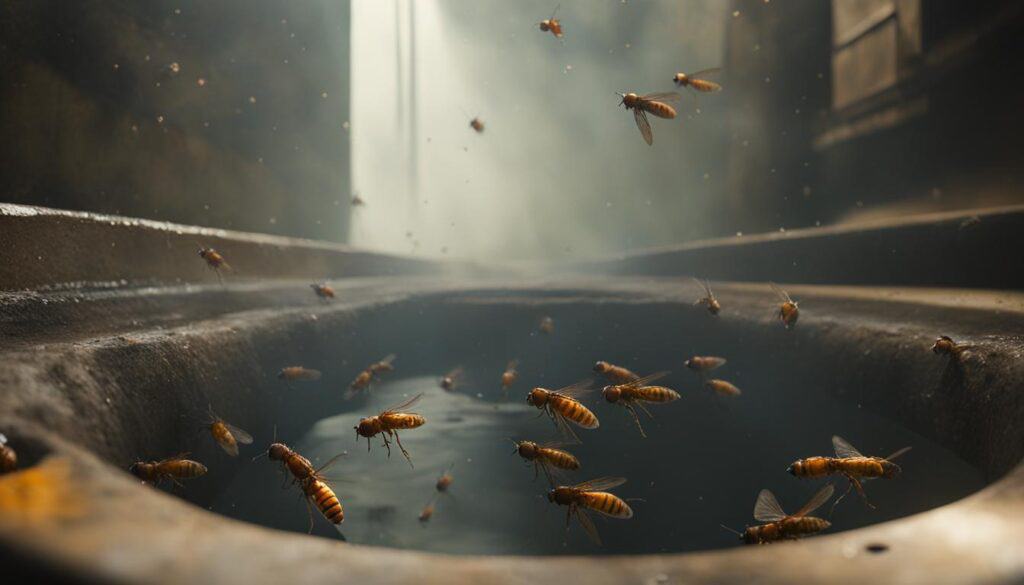
If drain flies or fruit flies continue to persist despite your best efforts with DIY methods, it may be necessary to seek professional help. Pest control experts have the knowledge and tools to effectively eliminate severe infestations and ensure long-term prevention.
“When dealing with a severe fruit fly infestation in drains, it’s crucial to enlist the expertise of a professional pest control service. They have the experience and resources required to identify and target the source of the infestation, implement appropriate control methods, and offer guidance on preventing future outbreaks.”
Professional pest control services can offer a range of drain fly control methods tailored to your specific situation. These may include:
- Thorough inspection and assessment of drains, plumbing, and sewage systems
- Application of targeted insecticides to eliminate adult flies
- Treatment of breeding areas to prevent larvae from developing
- Advice on implementing long-term preventive measures to avoid future infestations
By enlisting professional help, you can gain peace of mind knowing that your fruit fly infestation in drains will be addressed thoroughly and effectively.
Comparison of DIY and Professional Drain Fly Control Methods
| Control Methods | DIY | Professional |
|---|---|---|
| Expertise and Experience | Limited | Extensive |
| Tools and Resources | Basic household supplies | Specialized equipment and professional-grade insecticides |
| Safety | Potential risks when handling chemicals | Trained professionals ensure safe application |
| Effectiveness | Varies depending on individual expertise and methods used | High success rate in eliminating severe infestations |
| Long-term Prevention | Limited guidance on preventive measures | Expert advice and proactive prevention strategies |
As shown in the table, professional drain fly control methods offer several advantages over DIY approaches when dealing with severe infestations. Their expertise, specialized tools, and resources ensure a more thorough and effective eradication of fruit flies in drains, while also providing guidance on long-term preventive measures.
Staying Fruit Fly-Free
To prevent future fruit fly infestations, it is crucial to take proactive measures and maintain a clean and organized kitchen. By following these simple steps, you can effectively prevent fruit flies from taking over your space:
Proper Produce Storage
- Discard any spoiled fruits or vegetables immediately.
- Store fresh produce in the refrigerator to deter fruit fly attraction.
Maintaining Cleanliness
- Regularly wipe down kitchen counters and sinks with a disinfectant cleaner.
- Empty mop water buckets promptly to eliminate standing water, which can attract fruit flies.
Remember, prevention is key. By implementing these preventative measures, you can significantly reduce the risk of fruit fly infestations in your home.
By following these suggestions, you can create an environment that is less attractive to fruit flies and minimize the chances of a fruit fly infestation in your home. Remember to regularly clean and sanitize your kitchen, store produce properly, and eliminate any standing water sources. Taking these steps will help ensure a fruit fly-free environment.
The Harmless Nature of Fruit Flies
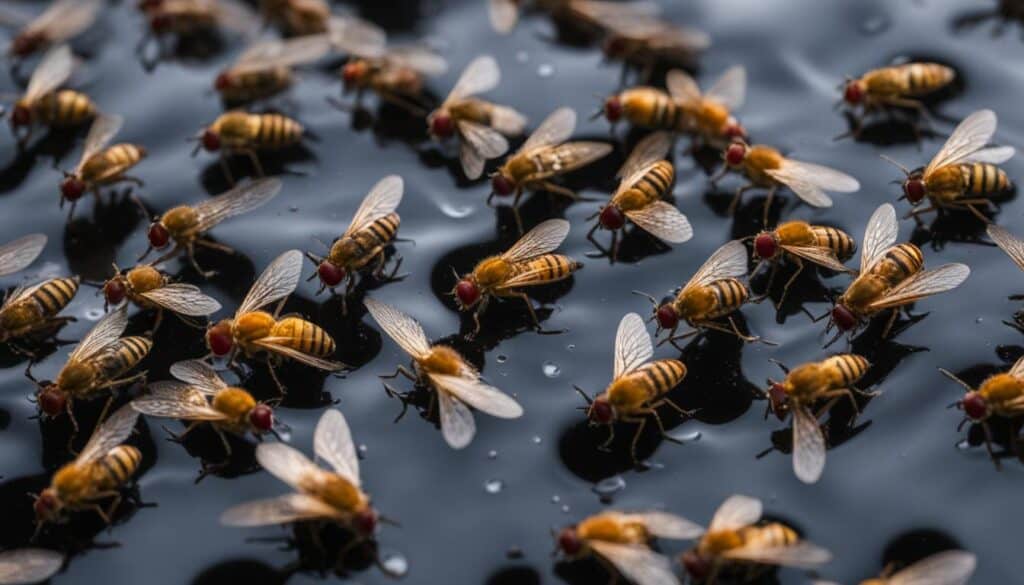
While fruit flies can be a nuisance, **they are generally harmless**. They do not bite or pose a direct health risk. However, **they can contaminate food surfaces with bacteria**. Fruit flies are attracted to decaying fruits and vegetables, and they can transfer pathogens from these sources to your countertops, utensils, and dishes.
To prevent fruit fly infestations in your home, it is essential to practice **proper sanitation and prevention methods**. Here are some tips to reduce the risk of fruit flies:
- Dispose of decaying fruits and vegetables: Regularly check and discard any overripe or spoiled produce.
- Store produce properly: Keep fresh fruits and vegetables in airtight containers or in the refrigerator to deter fruit flies.
- Keep your kitchen clean: Wipe down countertops, sinks, and other surfaces regularly to eliminate any potential food residues that may attract fruit flies.
- Empty and clean garbage bins: Make sure to take out the trash regularly and clean your garbage cans to avoid creating breeding grounds for fruit flies.
- Seal drain pipes: Fruit flies can live in drains, so it is advisable to install drain covers or screens to prevent them from entering.
By following these preventative measures, you can minimize the chances of a fruit fly infestation in your home. Remember, **early intervention and consistent maintenance** are key to keeping your kitchen fruit fly-free.
“Preventing fruit flies requires a proactive approach. Ensure that any potential sources of their attraction, such as decaying fruits and vegetables, are promptly removed and cleaned. The stakes may be high when it comes to maintaining a hygienic environment in your kitchen, as fruit flies can quickly multiply and become a constant headache if left unaddressed.” – Dr. Sarah Carter, Entomologist
In the case of a severe fruit fly infestation or if preventative measures have proven ineffective, it may be necessary to seek **professional pest control services**. Pest exterminators have the expertise and knowledge to assess the situation and provide solutions tailored to your specific needs.
Remember, while fruit flies may not directly harm humans, their presence can indicate unsanitary conditions and potential contamination of food surfaces. Take the appropriate steps to eliminate fruit flies and maintain a clean and hygienic kitchen environment.
Notable brands for fruit fly control products:
| Brand | Description |
|---|---|
| BioDrain | A commercial drain cleaner that effectively sanitizes and cleans drains, eliminating potential breeding grounds for fruit flies. |
| Fruit Fly BarPro | An innovative gaseous pest control product designed specifically to eliminate fruit flies and other flying insects. |
| FlyPunch! | A natural fruit fly trap that uses a combination of vinegar attractant and a sticky surface to catch and control fruit flies. |
Conclusion
In conclusion, fruit fly infestations in drains can be a troublesome issue in homes, particularly in the kitchen. These tiny pests can quickly multiply and become a nuisance, but there are effective ways to get rid of them and prevent future infestations.
To eliminate fruit flies from drains, it is important to properly identify the type of fly infestation. Once identified, thorough cleaning of the drains is essential. Running hot water down the drain and using a homemade solution of baking soda and vinegar or a commercial drain cleaner can help sanitize and eliminate the flies’ breeding grounds.
In addition to drain cleaning, setting up DIY fruit fly traps using vinegar and dish soap can help capture and eliminate adult fruit flies. Regular sanitation practices, such as disposing of decaying fruits and vegetables and maintaining a clean kitchen environment, can drastically reduce the risk of fruit fly infestations.
By implementing these strategies and maintaining regular maintenance and cleanliness, homeowners can effectively eliminate fruit fly infestations in drains and prevent future occurrences. Remember, proper identification, thorough cleaning, and preventative measures are key to keeping fruit flies at bay.
FAQ
Can fruit flies live in drains?
Yes, fruit flies can live in drains if there are decaying fruits or vegetables present. They are attracted to the organic matter in drains and can breed there.
What is the difference between drain flies and fruit flies?
Drain flies are commonly found near drains, leaky pipes, or sewers, while fruit flies are typically found in kitchens and pantries. Drain flies have hairy bodies and wings, while fruit flies do not.
How can I get rid of drain flies?
To eliminate drain flies, it is important to identify the source of the infestation and clean the drain thoroughly. Running hot water down the drain, using baking soda and vinegar, or using a commercial drain cleaner can help remove debris and sanitize the drain.
How can I remove fruit flies from drains?
To remove fruit flies from drains, it is important to dispose of any decaying fruits or vegetables and clean the drain. Using a fan to disrupt the flight patterns of fruit flies and setting up DIY traps with vinegar and dish soap can help trap and eliminate them.
How can I prevent drain flies and fruit flies?
To prevent drain flies and fruit flies, maintain cleanliness and proper sanitation practices in the kitchen. This includes throwing out decaying fruits and vegetables, keeping sinks and garbage disposals clean, and fixing any leaks or drainage issues.
What should I do if DIY methods don’t work?
If drain flies or fruit flies persist despite DIY methods, it may be necessary to seek professional help. Pest control experts have the knowledge and tools to eliminate severe infestations and ensure long-term prevention.
How can I stay fruit fly-free?
To avoid future fruit fly infestations, store produce properly, maintain cleanliness in the kitchen, and wash produce immediately after purchase. Regularly wipe down counters and sinks and empty mop water buckets to eliminate standing water.
Are fruit flies harmful?
Fruit flies are generally harmless and do not bite or pose a direct health risk. However, they can contaminate food surfaces with bacteria, so proper sanitation and prevention methods are important.
What is the conclusion on fruit flies in drains?
Fruit flies can live in drains and become a nuisance in the kitchen. Proper identification and elimination methods, along with maintenance and sanitation practices, can effectively eliminate fruit flies and prevent future infestations.

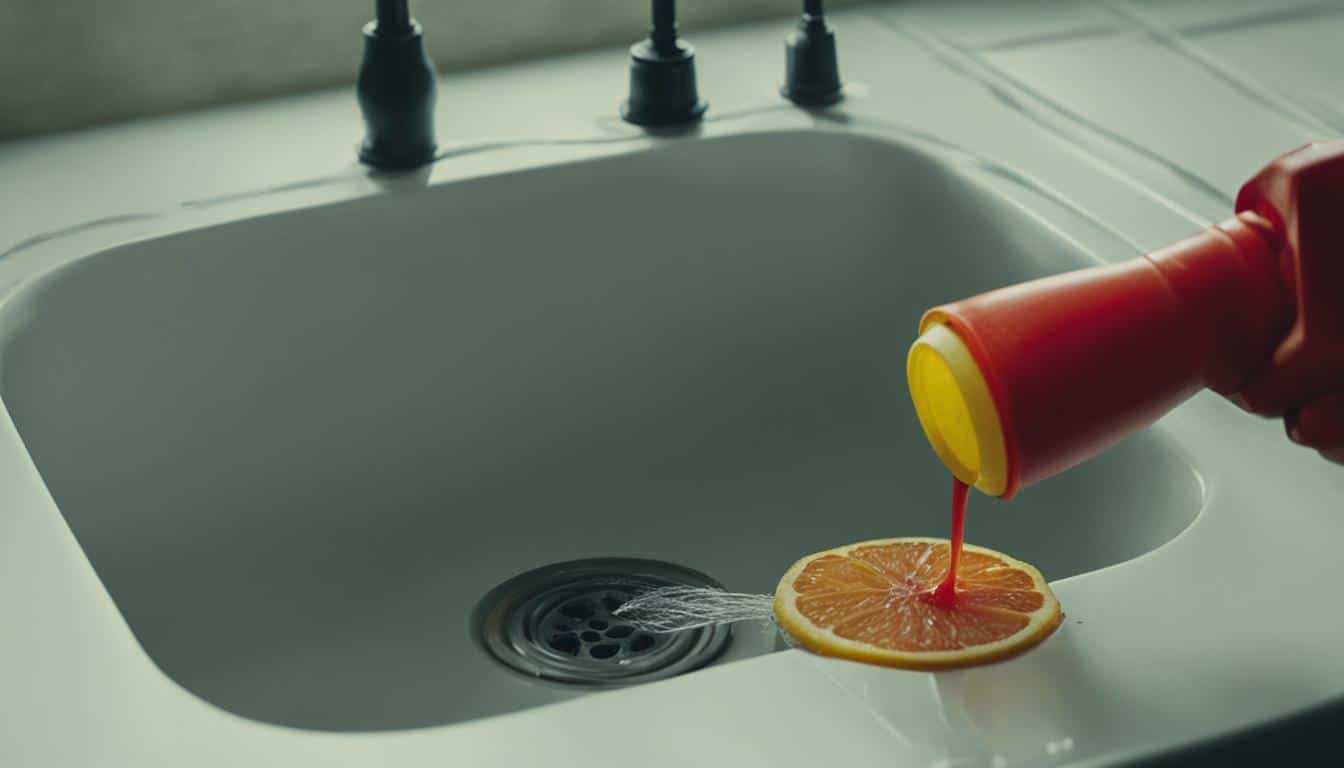



Leave a Reply